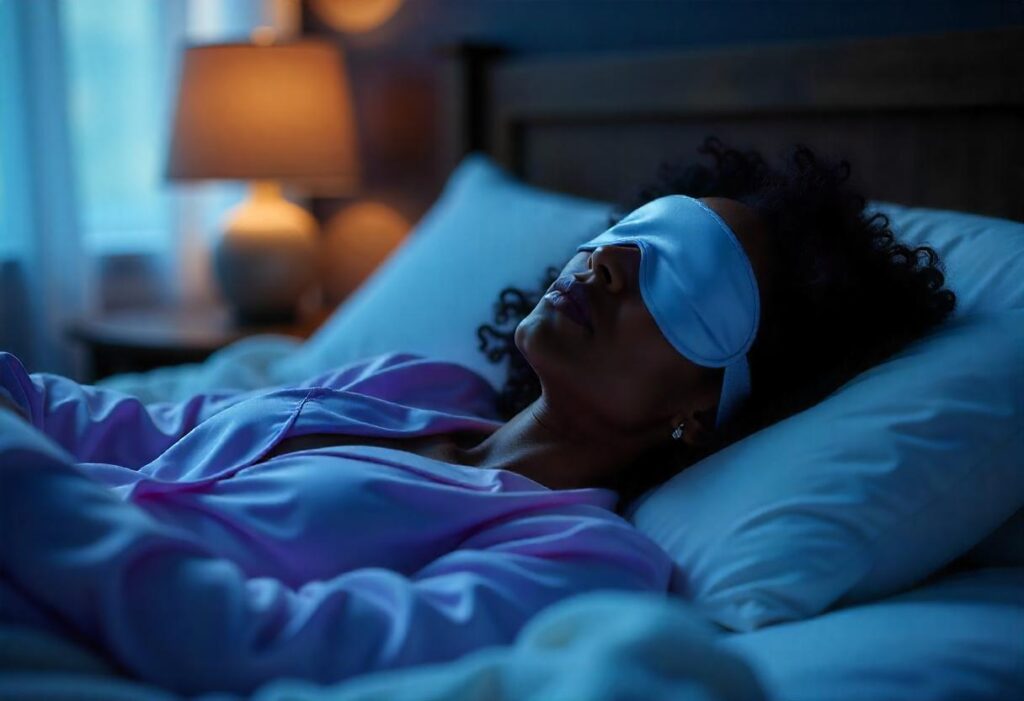Many of us struggle to fall asleep or stay asleep throughout the night. Whether it’s due to stress, poor habits, or environmental factors, the result is the same feeling tired and sluggish the next day. Sleep hygiene is the practice of developing healthy habits and creating an environment conducive to restful sleep.
A good night’s sleep is not just about feeling rested; it directly impacts your physical health, mental clarity, and overall well-being. If you’re looking to improve your sleep patterns, enhance your energy levels, and improve your performance, understanding and applying proper sleep hygiene can make all the difference. Let’s dive into the proven sleep hygiene tips, stay with us folks!
What is Sleep Hygiene?
Sleep hygiene is the term used to describe a set of habits, practices, and environmental factors that work together to help you fall asleep easily and maintain a high-quality, restful sleep throughout the night. While the term “hygiene” is commonly associated with cleanliness, in the case of sleep, it refers to the “cleanliness” or health of your sleep habits and your environment. Good sleep hygiene helps regulate your sleep cycle, ensuring that your body gets the restorative rest it needs to function optimally.
In today’s world, many of us struggle with getting a good night’s sleep due to modern-day distractions, stress, or irregular sleep schedules. Sleep hygiene is about creating a sleep routine that works for your body’s natural circadian rhythm, the internal clock that dictates when you feel awake and when you feel tired.
Good sleep hygiene goes beyond just the number of hours spent in bed. It involves setting up a routine that signals to your body when it’s time to relax and unwind, and when it’s time to rest fully. It also includes optimizing your sleep space so that you are physically comfortable and free from distractions that could interfere with your ability to sleep deeply.
The Role of Sleep Hygiene in Your Overall Health
When people talk about improving their sleep hygiene, the focus is usually on two main components: environmental factors and behavioral habits. These components work together to create an atmosphere where your body can rest properly and your mind can reset.
Environmental Factors:
- Sleep Environment: Creating a sleep-friendly environment is crucial. For instance, keeping your bedroom dark, quiet, and at a comfortable temperature can significantly improve your sleep quality. Your mattress, pillows, and bedding also play a major role in providing physical comfort and supporting your body during sleep.
- Limit Distractions: Distractions such as noise, light, and even the use of electronic devices (which emit blue light) before bed can interfere with your ability to wind down. Optimizing your bedroom for relaxation and restfulness is key to maintaining good sleep hygiene.
Behavioral Habits:
- Sleep Schedule: Establishing a consistent bedtime and wake-up time, even on weekends, is a crucial part of sleep hygiene. This helps train your body’s internal clock and allows you to fall asleep and wake up with ease, making it less likely that you’ll suffer from insomnia or excessive fatigue during the day.
- Bedtime Routine: Engaging in a calming pre-sleep routine signals to your body that it’s time to wind down. Whether it’s reading a book, practicing meditation, or taking a warm bath, these activities help signal that sleep is near.
- Exercise and Nutrition: The impact of exercise and what you eat during the day can influence how well you sleep at night. Regular physical activity can promote deeper, more restorative sleep. Additionally, being mindful of what you eat before bedtime (like avoiding caffeine or heavy meals) is important for avoiding sleep disruptions.
How Does Sleep Hygiene Affect Your Mental and Physical Health?
Your sleep quality is directly tied to both mental and physical health, which is why sleep hygiene is so essential. Here are a few ways that improving your sleep hygiene can have a positive impact on your well-being:
1. Improved Cognitive Function:
Sleep plays a vital role in consolidating memories, processing information, and enhancing focus and concentration. A consistent sleep routine promotes better cognitive performance, making it easier to stay alert and productive during the day.
2. Increased Energy Levels:
Proper sleep hygiene ensures that your body receives restorative sleep cycles, boosting your energy reserves. Better quality sleep means you’ll wake up feeling refreshed and ready to take on the day, rather than feeling sluggish or fatigued.
3. Better Emotional Health:
When you follow healthy sleep practices, your mood can improve as well. Sleep deprivation has been shown to contribute to increased stress and anxiety levels. A solid sleep routine helps your body manage stress more effectively and regulate emotions better.
4. Enhanced Physical Health:
Sleep is crucial for physical recovery, especially for athletes and those who engage in regular physical activity. During deep sleep, your body undergoes processes like muscle repair, tissue growth, and the release of growth hormones. Without good sleep, your body struggles to recover, which can negatively impact performance, immune function, and overall health.
5. Weight Management:
Quality sleep is essential for maintaining a healthy weight. Poor sleep can disrupt hormones that regulate appetite, such as ghrelin and leptin, leading to increased cravings for unhealthy foods.
Also Read the Latest: How Long Before Bed Should You Stop Using Your Phone?
Why Sleep Hygiene Matters
Sleep is crucial for various aspects of your health, from cognitive function to physical recovery. Poor sleep habits can lead to long-term health problems, such as:
- Reduced cognitive function: Lack of sleep affects your memory, concentration, and decision-making abilities.
- Increased stress levels: Sleep deprivation can make you more susceptible to stress and anxiety.
- Weakened immune system: Chronic sleep issues may lower your immune defenses, making you more prone to illnesses.
- Poor physical recovery: If you’re an athlete or physically active, poor sleep can hinder muscle recovery and performance.
By adhering to a few simple yet effective sleep hygiene tips, you can set yourself up for a restful night and wake up ready to tackle your day with energy and focus.
Tip 1: Maintain a Consistent Sleep Schedule
One of the most effective ways to improve your sleep hygiene is by sticking to a regular sleep schedule. Going to bed and waking up at the same time every day helps regulate your body’s internal clock (circadian rhythm), making it easier for you to fall asleep and wake up naturally.
Even on weekends or days off, try not to sleep in excessively or stay up too late. A consistent sleep schedule helps your body understand when it’s time to rest, allowing you to fall asleep more easily and wake up feeling refreshed.
Why it matters:
- Consistency reinforces the natural rhythm of your body, making it easier to get quality sleep.
- It helps regulate the production of melatonin, the hormone responsible for sleep.
Tip 2: Create a Relaxing Bedtime Routine
Having a calming pre-sleep routine can signal to your brain that it’s time to wind down. Avoid engaging in stimulating activities like watching intense TV shows, working, or using your phone right before bed. Instead, consider activities like reading a book, taking a warm bath, or practicing relaxation techniques such as meditation or deep breathing.
Why it matters:
- A bedtime routine lowers your stress levels and helps prepare your body and mind for sleep.
- It signals the body to release calming hormones like serotonin, making it easier to fall asleep.
Tip 3: Optimize Your Sleep Environment
Your bedroom should be a sanctuary for sleep. If your environment is too bright, noisy, or uncomfortable, it can disrupt your sleep. Here are a few tips to make your bedroom a sleep-friendly space:
- Keep the room dark: Light signals to your body that it’s time to be awake. Use blackout curtains or an eye mask to block out unwanted light.
- Control noise: If you’re sensitive to noise, consider using earplugs or a white noise machine to block out background sounds.
- Set a comfortable temperature: Most people sleep best in a cool room (around 60-67°F or 15-19°C). Experiment with the temperature to find what works best for you.
- Invest in a quality mattress and pillows: A comfortable mattress and pillows can significantly improve your sleep quality by supporting proper alignment and reducing discomfort.
Why it matters:
- A dark, quiet, and comfortable room promotes deep sleep and minimizes disruptions throughout the night.
- Temperature control helps regulate your body’s internal temperature, which is crucial for falling and staying asleep.
Also Read the Latest: How Sleep Tourism Became 2025’s Leading Wellness Trend

Tip 4: Limit Screen Time Before Bed
In our modern world, we’re constantly surrounded by screens, phones, tablets, laptops, and televisions. However, the blue light emitted by these devices can interfere with the production of melatonin, the hormone that helps you fall asleep.
Try to avoid using screens at least 30-60 minutes before bed. Instead, choose activities that don’t involve electronic devices, like reading or journaling. If you must use your phone, consider enabling a “night mode” setting to reduce blue light exposure.
Why it matters:
- Blue light disrupts melatonin production, making it harder for your body to relax and fall asleep.
- Reducing screen time allows your brain to prepare for sleep naturally.
Tip 5: Watch What You Eat and Drink
What you consume before bed can have a significant impact on your sleep. Certain foods and beverages can either promote or disrupt sleep. Here are a few things to consider:
- Avoid caffeine and nicotine: These substances are stimulants that can keep you awake. Limit your intake of coffee, tea, soda, or nicotine products at least 4-6 hours before bedtime.
- Don’t eat heavy meals right before bed: Large meals can cause discomfort, indigestion, or acid reflux, all of which can interfere with sleep.
- Consider a light snack: If you’re hungry before bed, opt for a light snack that combines protein and carbohydrates, such as a banana with peanut butter or a small bowl of oatmeal. This can help regulate blood sugar levels and promote relaxation.
Why it matters:
- Avoiding stimulants like caffeine and nicotine helps your body wind down naturally.
- A light snack prevents hunger from disturbing your sleep while avoiding indigestion issues.
Tip 6: Get Regular Exercise
Exercise plays a key role in improving the quality of your sleep. Physical activity helps tire your body out and promotes deeper, more restful sleep. However, timing is important, exercising too close to bedtime may have the opposite effect and make it harder for you to wind down.
Aim to finish any vigorous exercise at least 3-4 hours before bedtime. A light walk or stretching before bed can be a great way to relax.
Why it matters:
- Regular exercise enhances deep sleep and reduces the time it takes to fall asleep.
- Physical activity triggers the release of endorphins, which help reduce stress and anxiety.
Tip 7: Manage Stress and Anxiety
Stress and anxiety are two of the most common causes of sleep disturbances. If your mind is racing with worries or thoughts before bed, it can be difficult to relax and fall asleep.
Incorporate stress-reducing activities into your daily routine. Practices like mindfulness meditation, yoga, and journaling can help calm your mind and prepare your body for restful sleep.
Why it matters:
- Managing stress reduces mental clutter, allowing you to fall asleep faster.
- Relaxation techniques help your mind disengage from daily worries and focus on rest.
Tip 8: Limit Naps During the Day
Taking naps can be a great way to recharge during the day, especially if you’ve had a restless night or need a quick energy boost. However, it’s important to be mindful of when and how long you nap, as it can significantly affect your ability to sleep well at night. Napping at the wrong time or for too long can interfere with your body’s natural sleep cycle, leaving you tossing and turning when bedtime arrives.
The Benefits of Short Naps
Short naps typically last anywhere from 20 to 30 minutes, and they are a great way to give your body and mind a quick rest. These brief naps can help you:
- Boost Alertness: A short nap can improve your focus, productivity, and overall energy levels. It provides a quick refresh without leaving you feeling groggy or disoriented, which often happens after longer naps.
- Improve Mood: Napping for a short duration can enhance your emotional state, helping you combat any midday irritability or stress, which can improve your interactions with others and your ability to complete tasks.
- Enhance Cognitive Function: A power nap can help improve your memory, concentration, and problem-solving skills, making it easier to get through the day with a sharper mind.

The Downsides of Long or Late-Day Naps
While napping can be beneficial, taking long naps, especially later in the day, can disrupt your nighttime sleep and make it more difficult to follow a consistent sleep schedule. Here’s why:
- Interference with Sleep Drive: When you take a nap, especially one lasting longer than 30 minutes, you are essentially interrupting your body’s natural sleep cycle. This reduces your sleep drive, the biological urge to sleep that builds up during the day as you stay awake. If you nap for too long or at the wrong time, your body won’t feel as ready to fall asleep at night, leading to a later bedtime and a potentially restless night.
- Difficulty Falling Asleep: Napping in the late afternoon or evening can confuse your body’s internal clock, making it harder for you to unwind and fall asleep at your regular bedtime. Even if you feel tired, your body may have already had its rest earlier, so you may end up lying awake in bed, frustrated by your inability to sleep.
- Disturbed Sleep Quality: Taking naps too late in the day can impact the depth and quality of your nighttime sleep. Your body may struggle to enter deep sleep stages, such as REM (Rapid Eye Movement) sleep, which is essential for restorative rest. This can leave you feeling groggy in the morning and affect your overall health.
Why Timing and Duration Matter
The key to effective napping is timing. Aim to nap earlier in the day, ideally between 1 p.m. and 3 p.m., when the body naturally experiences a dip in energy. This mid-afternoon lull makes it easier for you to rest and recharge without negatively affecting your nighttime sleep.
Limiting your naps to 20-30 minutes is another important consideration. This is the optimal duration to experience the benefits of a nap without entering deeper sleep stages, which can make waking up difficult and lead to grogginess. By sticking to this short nap window, you’ll avoid sleep inertia and the groggy feeling you get after a long nap.
How to Make the Most of Your Naps
If you find that napping helps you stay productive and energized, here are a few strategies to optimize your naps:
- Set an Alarm: If you’re concerned about oversleeping, set an alarm to remind you when to wake up. This helps ensure your nap doesn’t extend past the optimal duration.
- Create a Comfortable Space: Find a quiet, comfortable spot to rest, free from distractions. A dark room with a cool temperature can help promote faster relaxation and prevent disturbances during your nap.
- Stay Consistent: Try to nap around the same time each day. Consistency helps regulate your circadian rhythm, making it easier to fall asleep and wake up at the same time each day.
Why It’s Important to Find Balance
The goal isn’t to eliminate naps altogether, it’s about striking the right balance. Short naps can be a helpful tool for increasing productivity and alleviating fatigue, but if you’re consistently relying on naps to get through the day, it could be a sign that you’re not getting enough sleep at night. Ideally, your nighttime sleep should be your primary source of rest, and naps should only be a supplement when needed.
Final Thoughts | The Key to Better Sleep
Sleep hygiene isn’t a one-time fix; it’s about creating a lifestyle that prioritizes rest and well-being. By implementing the tips above and maintaining healthy sleep habits, you can improve both the quality and duration of your sleep. The benefits go beyond just feeling rested, they can help you perform better, think more clearly, and lead a healthier, more energetic life.
At Active Health Sport, we believe that proper sleep is an essential part of maintaining overall health and achieving peak performance. Incorporating good sleep hygiene practices into your daily routine can significantly improve your physical health, mental clarity, and quality of life. Start with small changes, and soon you’ll be on your way to enjoying more restful and rejuvenating sleep!
Sleep is an essential part of your overall well-being, and with the right habits, you can unlock the full benefits of a restful night. We’d love to hear your thoughts on how understanding hydration in different temperatures has impacted your daily routine! How have these tips helped improve your energy, focus, or overall well-being? Share your experiences, questions, or any hydration strategies you’ve found useful in the comments below, or reach out to us via our Contact Us page.
You might also like…
- Why Mobility Matters More Than Muscle for CrossFit Progress
 In CrossFit culture, strength numbers often steal the spotlight: heavier deadlifts, faster WOD times, and bigger PRs. While muscle and power are essential, they are not the limiting factor for long-term CrossFit progress.… Read more: Why Mobility Matters More Than Muscle for CrossFit Progress
In CrossFit culture, strength numbers often steal the spotlight: heavier deadlifts, faster WOD times, and bigger PRs. While muscle and power are essential, they are not the limiting factor for long-term CrossFit progress.… Read more: Why Mobility Matters More Than Muscle for CrossFit Progress - Zone-2 Walking for CrossFit Athletes Explained
 In CrossFit, conditioning is often associated with intense, fast-paced WODs, high heart rates, and breathless finishes. While this intensity builds power and short-term fitness, it does not fully support aerobic efficiency, recovery capacity,… Read more: Zone-2 Walking for CrossFit Athletes Explained
In CrossFit, conditioning is often associated with intense, fast-paced WODs, high heart rates, and breathless finishes. While this intensity builds power and short-term fitness, it does not fully support aerobic efficiency, recovery capacity,… Read more: Zone-2 Walking for CrossFit Athletes Explained - How Low-Intensity Walking Restores the Nervous System
 CrossFit is designed to test physical limits. Heavy lifts, fast-paced metabolic conditioning, and complex gymnastic movements demand not only muscular strength but also significant nervous system output. While most athletes focus on muscle… Read more: How Low-Intensity Walking Restores the Nervous System
CrossFit is designed to test physical limits. Heavy lifts, fast-paced metabolic conditioning, and complex gymnastic movements demand not only muscular strength but also significant nervous system output. While most athletes focus on muscle… Read more: How Low-Intensity Walking Restores the Nervous System

Kait Amazra is the founder and lead writer of Active Health Sport. With over 25 years of experience in health, fitness, and wellness education, Kait combines professional expertise with a passion for helping people live stronger, healthier, and more balanced lives.
As a licensed health and fitness professional, Kait has worked alongside industry experts to deliver evidence-based insights on physical activity, nutrition, recovery, and holistic well-being. Through Active Health Sport, Kait’s mission is to make trusted, practical, and science-backed health information accessible to everyone, from beginners building new habits to athletes seeking peak performance.

